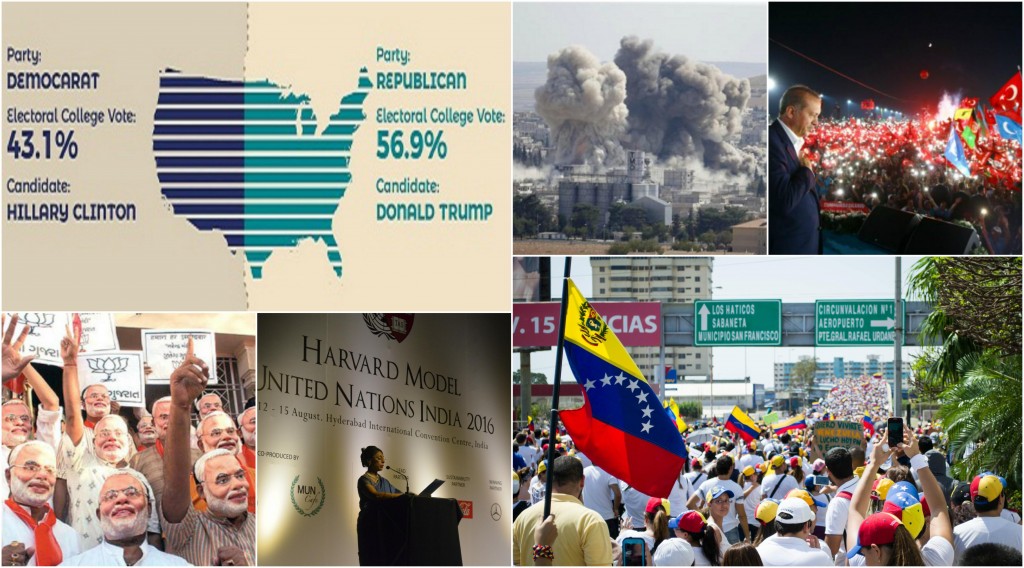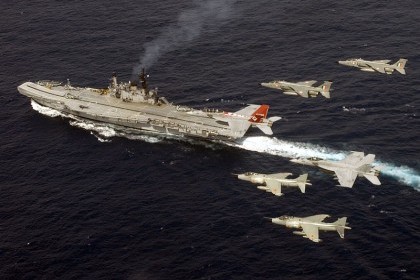In January 2016, Gateway House identified and outlined emerging global geopolitical trends. As the year comes to an end, several of these have become unprecedented dislocations and dispersals.
Politics becomes nationalist
As foreseen, 2016 saw a resurgence of nationalism and right-wing politics. The year was filled with elections and referendums – from the U.S. elections to Brexit and the Colombia-FARC referendum. Around the world, the narrow margins and unexpected results strengthened one common theme – the rejection of an established political elite and their determined control over the status quo.
Learn more:
The year of the close vote: a 50:50 world by Devanshi Jain, Social Media Manager, and Neelam Deo, Director, Gateway House
Has nationalism made a global comeback? by Neelam Deo, Director and Aditya Phatak, Senior Researcher, Gateway House
Populism as a threat to the UN by Manjeet Kripalani, Executive Director, Gateway House
Turkey’s fight for democracy by Huricihan Islamoglu, Visiting Fellow, Gateway House
Syria: energy battles to regional alliances by Huricihan Islamoglu, Visiting Fellow, Gateway House
Latin America’s right angle? by Deepak Bhojwani, former Indian Ambassador
China’s new power base
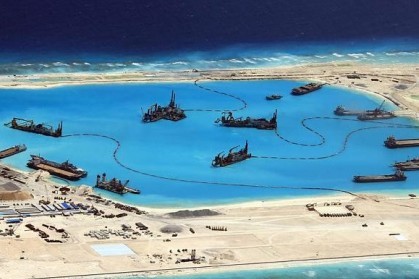
Xi Jinping’s consolidation of power as president of China was completed in 2016, replacing the ‘peaceful rise of China’ with China now projecting itself as a ‘new type of great power’. Over the course of the year, one such forecasted stress point became a reality in July when China escalated its contentious assertions over the South China Sea, dismissing the ruling of the Permanent Court of Arbitration (PCA) on the applicability of the United Nations Convention on the Law of the Seas on the various claims in the region. Despite winning the ruling, ASEAN nations and their American ally have been unable to make China budge on the issue.
Learn More:
The case of the South China Sea by Joost van Deutekom, Summer Researcher, Gateway House
South China Sea: more trouble by Vice Admiral Anil Chopra, Distinguished Fellow, International Security and Maritime Studies, Gateway House

Across Asia, China has been hard at work on its ambitious One Belt One Road (OBOR) initiative which aims to develop regional connectivity to strengthen trade routes between China and Europe via both land and sea routes. As outlined, 2016 has seen an expansion of the initiative across South Asia with the completion of Gwadar Port in Pakistan being announced in November. The port has been a keystone in the China-Pakistan Economic Corridor (CPEC) and the larger OBOR initiative. Alongside the CPEC, sizable Chinese investments across South Asian nations have been seen, which have been mapped in a special project by Gateway House.
Learn More:
Gwadar and “the String of Pearls”, Tim Willasey-Wilsey
Geoeconomic dilemma in realigning Asia, Hans Kundnani
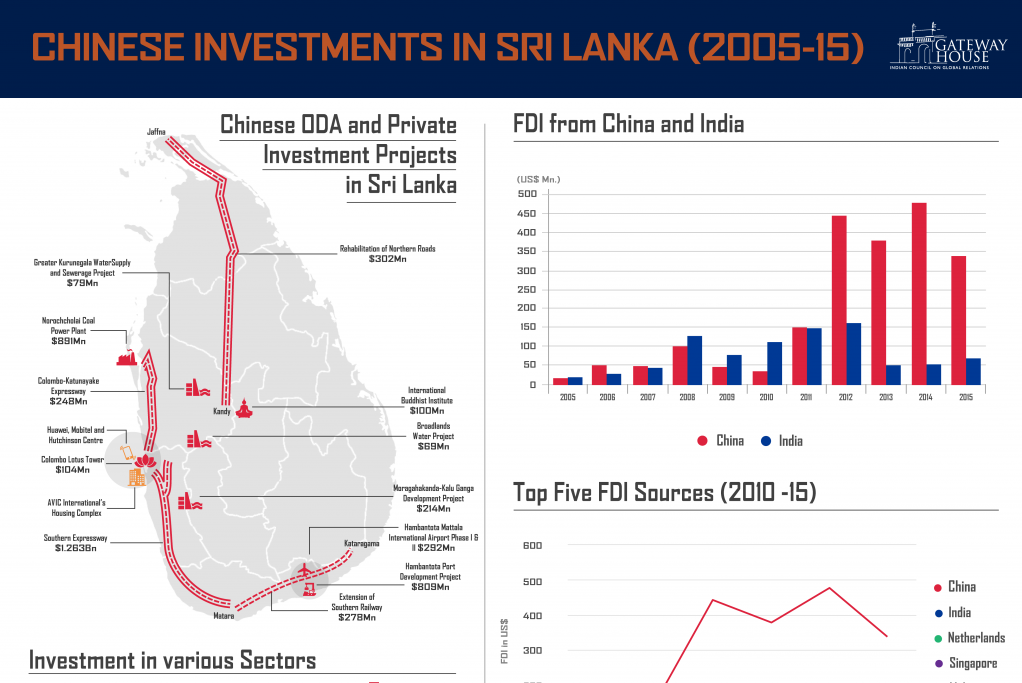 Chinese investments in Sri Lanka by Rajiv Bhatia, Kunal Kulkarni, Lina Lee, and Shivani Gayakwad
Chinese investments in Sri Lanka by Rajiv Bhatia, Kunal Kulkarni, Lina Lee, and Shivani Gayakwad
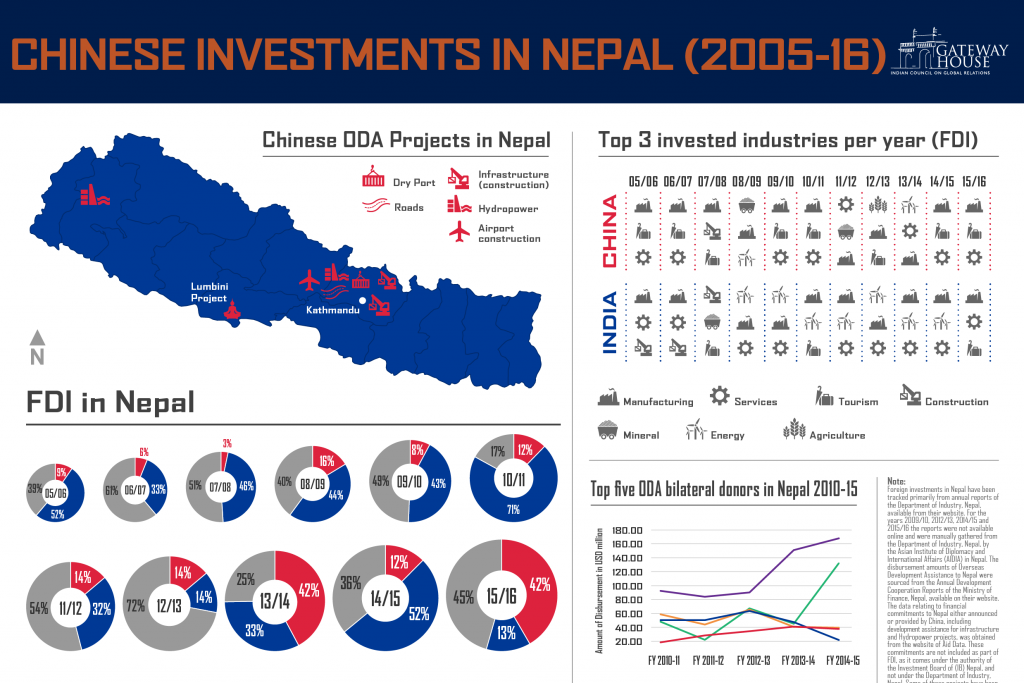 Chinese investments in Nepal by Rajiv Bhatia, Joost Van Deutekom, Lina Lee, Kunal Kulkarni, and Bishal Nyoupane
Chinese investments in Nepal by Rajiv Bhatia, Joost Van Deutekom, Lina Lee, Kunal Kulkarni, and Bishal Nyoupane
A stronger India-U.S. bilateral
Closer strategic relations between India and the U.S. were envisioned for 2016, and became a reality in August 2016 with the signing of the Logistical Exchange Memorandum of Agreement (LEMOA). This agreement built on the 2015 ‘U.S.-India Joint Strategic Vision for Asia-Pacific and the Indian Ocean Region’ and saw meaningful success in how India negotiated to maintain its strategic autonomy.
Learn More:
India-U.S.: convergence and divergence, Seema Sirohi, Analyst
India: openly-allied with the U.S. by Neelam Deo, Director and Aditya Phatak, Senior Researcher, Gateway House
India-U.S. defence win by Sameer Patil, Fellow, National Security, Ethnic Conflict and Terrorism Studies, Gateway House
LEMOA: a natural progression in Indo-U.S. ties by Sameer Patil, Fellow, National Security, Ethnic Conflict and Terrorism Studies, Gateway House
The receding Old World Western Order
As opined in January, the political rhetoric on both sides of the Atlantic is becoming increasingly protectionist and anti-globalisation. The UK’s decision to ‘Brexit’ from the European Union in June provided the first shock to the geopolitical Bretton Woods system. The real blow, however, came from the unprecedented victory of Donald Trump in November’s U.S. Presidential election, which now threatens to upend the old order, and promises that 2017 will become the year for a New World Order.
Learn more:
Dismantling the geopolitical Bretton Woods by Neelam Deo, Director and Aditya Phatak, Senior Researcher, Gateway House
Trump: a win for the New World Order by Manjeet Kripalani, Executive Director, Gateway House
Brexit: a wake-up call for global elites by Gateway House
Brexit, NATO, EU: emerging dichotomies by Neelam Deo, Director, Gateway House
U.S. Votes 2016: a podcast miniseries
Arjun Chawla is a Researcher at Gateway House
This article was exclusively written for Gateway House: Indian Council on Global Relations. You can read more exclusive content here.
For interview requests with the author, or for permission to republish, please contact outreach@gatewayhouse.in.
© Copyright 2016 Gateway House: Indian Council on Global Relations. All rights reserved. Any unauthorized copying or reproduction is strictly prohibited



